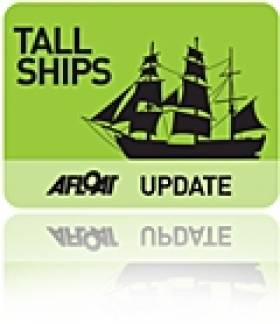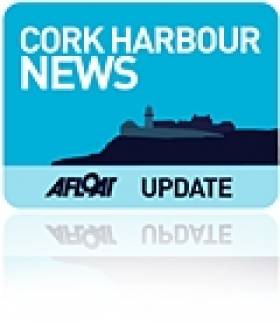Displaying items by tag: Sail Training Ireland
Sail Training Ireland Assumes Mantle of Asgard
Writing in the Irish Independent on Saturday, WM Nixon welcomes the introduction of Sail Training Ireland as a big step towards getting Ireland back into tall ship sailing.
Nixon also pays tribute to Ireland's previous square-rigger, Asgard II, which held its own among taller competitors for almost three decades before its sinking in the Bay of Biscay in 2008.
That ship was also remarkable for being "one of the very few government owned and run sail training ships in the world".
In the wake of Asgard II, a new approach is being taken with Sail Training Ireland - which is an officially recognised voluntary trust, actively supported by the Irish Sailing Association, that is open to anyone and free to accept donations and corporate endowments.
"The sailing community and all those interested in promoting maritime affairs now have an opportunity for self-reliance," writes Nixon, who notes that while we get back on the road to having our own tall ship, Sail Training Ireland will be able to place Irish trainees on other ships already sailing for invaluable experience.
New Tall Ship Sailing Body Seeks Part-Time Manager
Sail Training Ireland, the new body established by Cosite an Asgard and the Irish Sailing Association is looking to appoint a part-time manager to help with the development of a business plan for the new sailing organisation that will be officially launched in Dublin Port in a fortnight.
The appointment is offered on a self-employed basis for an initial period until 31 December 2011 after which this new position in Irish sailing may be reviewed subject to funds available. The deadline for receipt of applications is in three weeks time.
The role is on a part time basis of the equivalent of 1.5 days per week. A degree of flexibility is required.
Remuneration will be at a rate of €200 pw.
The full text of the advert publisherd today reads:
STIYD ManagerSail Training Ireland is looking to appoint a part-time manager to help with the development of a business plan and the day to day running of the organisations affaires.
Background
Since the Department of Defence declared they no longer had an interest in sponsoring the continuation of the Asgard Sail Training Programme, and the subsequent decision of the Board of Asgard to wind up the Company, a working group supported by the ISA has been working to establish a National Sail training Association.
Sail Training Ireland for Youth Development Ltd. has been established as a limited company recognised by Sail Training International as the representative body for Sail Training activities in Ireland.
The aims and objectives of the organisation are:
- To promote the development and Education of young Men and Women on the Island of Ireland in and through the Sail Training Experience regardless of Nationality, Culture, Religion, Gender or Social Background
- To promote Sail Training in the Island of Ireland and Worldwide having special regard to the promotion of and support for Sail training Vessels and their Training programmes
- To promote and encourage knowledge of all subjects associated with the sea and matters Maritime
- To sponsor and support sea-going Trainees
- To co-operate and engage with other Sail Training Associations and Organisations on the Ireland of Ireland and Internationally
- To work with Sail Training International to establish a recurring STI endorsed Tall Ships Maritime Festival every 3/5 Years.
Membership/Affiliation
Membership if STI will be open to:
- Irish Sail Training Operators
Organisations that may already exist and/or may be set up in the future.
- Supporting Organisations
Organisations that do not operate a vessel, and who support the aims and objectives of STI.
That have an interest in the development of sail training in Ireland
- Personal Members
Who would like to support the development of sail training in Ireland.
Business & Development Plan
In order to ensure the sustainability of STI, it is important that a credible plan and feasibility study is developed. This will require professional/contracted resource - funds for which may be raised through the existing goodwill and support for Ireland’s Sail Training Programme.
Key Responsibilities
1. Administrating the STI Bursary Scheme for 2011
a. Managing the payment of bursaries
b. Liaising with bursary recipients
c. Collating Reports from recipients
2. Developing a set of Rules for the Association
a. Membership/affiliation Structures
b. Procedures at meetings
c. Election of the board etc
3. Managing the accounts of the Association
a. Keep records
b. Processing of payments/income
4. Charitable Status
a. Apply for charitable status
5. Management of the Website/ liaising with the webmaster
a. Maintenance and management of content
6. Board Meetings
a. Organise meetings (venues dates etc)
b. Send out agenda
c. Take minutes
7. Business & Development Plan
a. Source/research required information
b. Draft plan
8. Membership/Affiliation
a. Develop membership/affiliation application system
b. Develop membership benefits
c. Administrate applications
d. Maintain database
9. Funding
a. Identify sources of funding, revenue generating opportunities
10. PR and Media
a. Develop media plan for STI to raise the profile
11. Queries
a. Respond to queries relating to Sail Training in Ireland
Terms and Conditions
The appointment will be offered on a self-employed basis for an initial period until 31 December 2011after which the position may be reviewed subject to funds available.
The role is on a part time basis of the equivalent of 1.5 days per week. A degree of flexibility is required.
Remuneration will be at a rate of €200 pw.
Applications
A letter of application and CV should be sent by email to:
Harry Hermon, [email protected], titled: “STIYD Application”
Closing date for applications is: Friday 22nd April. It is anticipated interviews will be held on Thursday 5th May.
Looking for further reading on Tall Ships in Ireland? Click the links below:
Click this link to read all our Tall Ships Stories on one handy page
Previewing Ireland's Tall Ships 2011 Season
Can Ireland Get a New Tall Ship?
Sheila Tyrrell to Chair New Sail Training Group
The new umbrella organisation Sail Training Ireland includes a number of key sailing people involved in sail training in Ireland including the chief executive of the Irish Sailing Association Harry Hermon and Seamus McLoughlin the head of operations of Dublin Port Company. The group also includes Kalanne O'Leary, a former member of Coiste an Asgard, the state board that ran Asgard II. The full group, chaired by Sheila Tyrrell, has been named as follows:
Sheila Tyrrell, Chair
Harry Hermon, ISA Chief Executive
Philip Cowman ISA Director, Ex Harbour Master Waterford
Kalanne O'Leary, Irish Representative on Sail Training International
Seamus McLoughlin, Head of Operations, Dublin Port
Sean Flood, Sail Training International Ambassador – Ireland.
Looking for further reading on Tall Ships in Ireland? Click the links below:
Click this link to read all our Tall Ships Stories on one handy page
Previewing Ireland's Tall Ships 2011 Season
Can Ireland Get a New Tall Ship?
New Organisation Announced for Sail Training in Ireland
A sailing initiative aimed at Irish participation in next year's Tall Ships Races in Waterford has been announced by a newly formed national organisation Sail Training Ireland.
Since the sinking of the Asgard II and the decision to wind up Coiste An Asgard, the Irish Sailing Association (ISA) has been facilitating a steering group with the aim of establishing 'Sail Training Ireland'.
The steering group has been working with Sail Training International to establish a sustainable organisation that will work with training providers and host ports to build Ireland's Sail Training Programme in the future.
The Tall Ships Race that visited Belfast last year is due to return to Waterford in 2011 and Dublin in 2012 is clear recognition by the race organisers of Ireland's popularity as a destination, and a credit to the host ports who are able to facilitate such a great occasion.
The working group are preparing for the launch of Sail Training Ireland in a few weeks and are currently putting together a feasibility study and business plan for the organisation that may be presented to the Minister in the New Year.
Sail Training International has awarded a bursary to Sail Training Ireland which will provide funding to support the participation of young people in The Tall Ships Races 2011 and 2012.
"The small group that has been working on this will put together a sensible, practical but ambitious plan to ensure the legacy of Coiste an Asgard...." explains Nigel Rowe, Chairman of Sail Training International, "....it will enable Irish youth to continue to benefit from the sail training experience".
Sheila Tyrrell, Chair of the steering group, who has a long history with sail training and in particular the Asgard remarks "The bursary from Sail Training International is very welcome and endorses the credibility of our plans to re-establish a national sail training programme. The steering group will be in a position to effect the launch of Sail Training Ireland this side of Christmas."
Looking for further reading on Tall Ships in Ireland? Click the links below:
Click this link to read all our Tall Ships Stories on one handy page
Previewing Ireland's Tall Ships 2011 Season
Can Ireland Get a New Tall Ship?































































